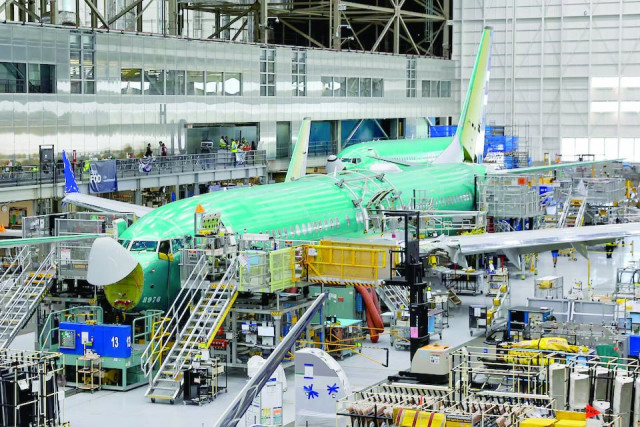Boeing seeks $35b as strike hammers finances
Files to raise up to $25b via stock, debt offerings; enters $10b credit agreement

Boeing filed papers with the US markets regulator on Tuesday announcing plans to raise up to $25 billion through a stock and debt offering and entered into a $10 billion credit agreement amid a crippling strike and upcoming debt maturities.
The planemaker is looking to shore up its finances that have been strained due to a slump in production of its best-selling 737 MAX jet following a mid-air door panel blowout earlier this year and a strike by thousands of union workers since September 13.
It was not clear when and how much Boeing will raise via the stock offering, but analysts estimate that Boeing would need to raise somewhere between $10 billion and $15 billion to be able to maintain its credit ratings, which are now just one notch above junk.
The planemaker added that the shelf registration, as part of which Boeing may sell stock and debt, will provide options to support its balance sheet over a three-year period.
Boeing's shares were up marginally on Tuesday.
"We take the vagueness and breadth of the shelf announcement and the need for the temporary financing as implying that the banks are struggling to sell this issue to potential investors or lenders," Agency Partners analyst Nick Cunningham said.
The offering was too big for immediate liquidity needs or not big enough to permanently refinance the company, Cunningham noted, adding that it may imply short term liquidity is worse than thought.
Cunningham suspended his recommendation and price target for Boeing;s shares, while adding that the comments on Monday by Emirates Airlines President Tim Clark were "sobering". "Unless the company (Boeing) is able to raise funds through a rights issue, I see an imminent investment downgrade with Chapter 11 looming on the horizon," Clark told the Air Current, an aviation industry publication.
Boeing will use the funds for general corporate purposes, according to paperwork filed with the US markets regulator on Tuesday. The planemaker had cash and cash equivalents of $10.89 billion as of June 30.
Strike costs
The strike is costing the company more than $1 billion per month, according to one estimate that was released before Boeing announced it will cut 17,000 jobs or 10% of its global workforce.
The company and the Machinists union, which represents about 33,000 striking workers in the US Pacific Northwest, are yet to reach an agreement over a new contract and talks have become increasingly heated. US Acting Labour Secretary Julie Su met with Boeing and the union in Seattle on Monday in a bid to break the deadlock.
US Acting Labour Secretary Julie Su met with Boeing and the union in Seattle on Monday in a bid to break the deadlock.
The planemaker was already reeling due to a regulator-imposed cap on production of its MAX jets after the mid-air cabin-panel blowout in January.
Boeing has $11.5 billion of debt maturing through February 1, 2026, and has committed to issuing $4.7 billion of its shares to acquire Spirit AeroSystems and assume its debt.


















COMMENTS
Comments are moderated and generally will be posted if they are on-topic and not abusive.
For more information, please see our Comments FAQ